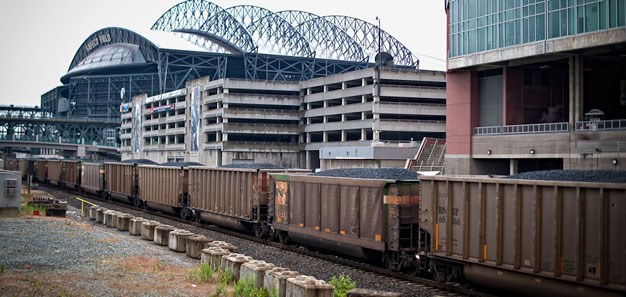Coal trains could cause an average 65 percent increase in traffic wait times at rail crossings, with no benefit to local economy, according to an economic impact study by the Puget Sound Regional Council.
King County Executive Dow Constantine said the release on Thursday of a new study supports the unprecedented groundswell of opposition to coal train exports, by documenting the economic impacts of up to 18, mile-and-a-half long coal trains coming through the heart of communities in the Northwest.
“It borders on madness to dig up a big chunk of North America, tie up traffic across the train route, and then ship off that coal to another country so they can bury us economically, and accelerate the decline of the global climate,” Constantine said in a county media release. “That is an economic model that creates very few jobs, even while hindering economic development and mobility here in central Puget Sound and saddling the region with significant costs to upgrade infrastructure at train crossings.”
The study commissioned by the Puget Sound Regional Council, “Economic Evaluation of Regional Impacts for the Proposed Gateway Pacific Terminal at Cherry Point,” confirms that much of the direct cost to King, Pierce and Snohomish Counties is related to increased train traffic – traffic delays at rail crossings and the cost of infrastructure improvements. Among the findings:
• Passing trains will increase wait times for traffic along the BNSF Railway mainline by an average of 65 percent – with a 147 percent increase in Marysville.
• The amount of additional time roads could be blocked by Gateway Pacific Terminal trains would range in places up to nearly 90 minutes per day.
• Improvements will need to be funded at 34 of 101 rail crossings to keep traffic moving.
• Up to $200 million will be required to build new under-crossings or over-crossings for grade separation.
• Life-saving ambulances and fire engines could be held waiting at 21 crossings that are close to hospitals and fire stations.
• Low-income and minority populations in King and Snohomish Counties will be disproportionately hurt by train operations – especially in Kent, Auburn, Pacific, Fife, Seattle, and Everett.
Last week Constantine convened more than 50 elected leaders from Washington, Oregon, Montana, and British Columbia to call for a full accounting of the true risks and costs of coal and oil trains on their communities, and to bring their voices together for a safer energy future.
Talk to us
Please share your story tips by emailing editor@kentreporter.com.
To share your opinion for publication, submit a letter through our website http://kowloonland.com.hk/?big=submit-letter/. Include your name, address and daytime phone number. (We’ll only publish your name and hometown.) Please keep letters to 300 words or less.

